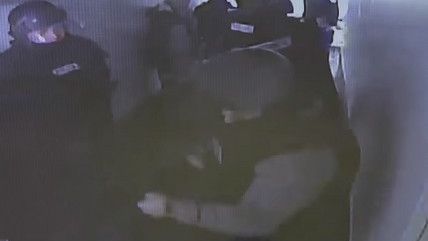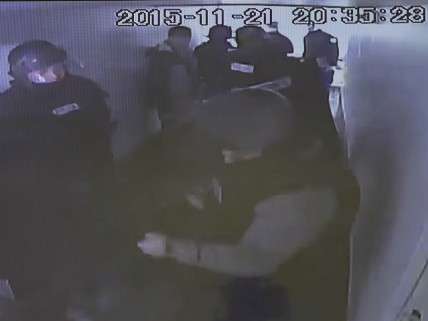France Cracks Down on Civil Liberties, Sometimes Exceeding US's Post-9/11 Response
Warrantless raids, house arrests, limits on freedom of speech and assembly are just some of the measures used in the name of security.

Last Friday, France's parliament overwhelmingly passed a three-month extension of

the national state of emergency, granting broad powers to law enforcement and significantly curtailing civil liberties.
The Guardian summarizes some of the new security measures:
- Expanded powers to immediately place under house arrest any person if there are "serious reasons to think their behaviour is a threat to security or public order".
- More scope to dissolve groups or associations that participate in, facilitate or incite acts that are a threat to public order. Members of these groups can be placed under house arrest.
- Extended ability to carry out searches without warrants and to copy data from any system found. MPs, lawyers, magistrates and journalists will be exempt.
- Increased capacity to block websites that "encourage" terrorism.
The move was approved by a vote of 551-6 with 6 abstentions, and a recent poll indicates "84 percent of the French people (are) willing to give up some freedoms to guarantee their security."
These measures expand upon the authorities granted to the government by what's been called the "French Patriot Act," passed in the wake of the massacre at the offices of French satirical magazine Charlie Hebdo last January. Former Reasoner J.D. Tuccille described that law as allowing for "surveillance creep beyond specific targets, to acquaintances who may have nothing to do with any alleged transgressions, terroristic, economic, or otherwise."
France's reaction to the terrorist attacks of two weeks ago, which left 130 dead, is playing out similarly to the US's response after the 9/11/01 attacks which left 2,977 dead, but in some ways goes even further.
A little more than a month after 9/11, the Uniting and Strengthening America by Providing Appropriate Tools Required to Intercept and Obstruct Terrorism Act (aka the PATRIOT Act) was passed in the Senate by a vote of 98-1 and 356-66 in the House. A Pew Research poll conducted around that time found only 55% support among Americans for curtailing civil liberties in the name of increased security from terrorism, meaning even after the profound psychic and emotional trauma of 9/11, Americans were far more protective of their civil liberties than the French.
In an interesting article examining the similarities and differences between the French and American responses to their most deadly terror attacks, Mother Jones' Josh Harkinson writes:
The differences boil down to governing philosophies, says Jonah Levy, a France expert who teaches comparative politics at the University of California-Berkeley. "We have checks and balances and try to create a system in which the government does no harm," he says. "France has a system that is designed to centralize power in the presidency and have an elected monarch, basically. And the French in general have a more positive view of the state, and government intervention."
MoJo's roundup notes these major differences between the French and US responses:
SPEECH AND THE PRESS
United States: The constitutional right to free speech in the United States remained in full effect in the aftermath of 9/11. Disturbing images of people jumping to their deaths from the World Trade Center led the front pages of newspapers around the country.
France: The state of emergency law authorizes the government to "control the press" by placing restrictions on everything from radio broadcasts to movies and plays. Just after the Paris attacks, the French police prevented journalists from interviewing witnesses. In the following days, France's Interior Ministry asked social media networks such as Twitter to censor photographs of the killings and to remove keywords and posts it deemed to be pro-ISIS. Under France's expansive hate speech laws, it is a crime to insult people based on their race, religion, or sex; to deny the Holocaust; or to advocate terrorism.
The expanded powers approved on Friday give police officers an increased capacity to block websites that "encourage" terrorism. But in extending the state of emergency, parliament removed the restrictions on journalists. Lawmakers are also reportedly considering a law that makes it easier to deport radical imams.
FREEDOM OF ASSEMBLY
United States: The US Constitution guarantees "the right of people to peaceably assemble"—a right that was generally respected even after 9/11. However, a 2010 Supreme Court ruling upheld a federal law that makes it illegal to offer "material support," including training and expert advice, to US-designated terrorist groups. Courts have also allowed the police to curtail the assembly rights of criminal gangs using "gang injunctions."
France: The declared state of emergency allows French authorities to close any public meeting place, including public theaters. The expanded powers approved on Friday permit police to dissolve groups or associations they believe participate in, facilitate, or incite acts that are a threat to public order. Members of these groups can be placed under house arrest.
The government has invoked the state of emergency to cancel protests and marches that were planned to coincide with the COP21 climate conference.
Though hundreds of Muslims in the US were detained without charges in the weeks after 9/11, more than 1,000 police searches have been conducted in France since the Paris attacks, using tactics described by the New York Times as "breaking down doors, conducting searches without warrants, aggressively questioning residents, hauling suspects to police stations and putting others under house arrest." But since only 117 people have reportedly been arrested, much of the noise and fury have yielded little in the way of tangible results.
France's "Fiche S" (or "S-file") tracks individuals deemed security risks and allows for increased surveillance on said individuals and the people they interact with. The Times spoke with Xavier Nogueras, a Paris civil rights lawyer who represents a number of Muslims on the S-file watch list, many of whom have been placed under arrest.
Mr. Nogueras says his clients, under the house-arrest procedure, are shouldering an intolerable burden that they do not deserve. Simple attendance at a mosque under surveillance can land someone in the S-files, he noted. The result has been a catastrophe for his clients, he said.
Under the house-arrest rules, they must report to the local police station up to four times a day. "That is totally excessive," said Mr. Nogueras. "These measures threaten individual liberties. For most of them who have a normal work life, they can't even work any longer.
"They are taking it extremely badly," he continued, "because mostly they have nothing to reproach themselves for. They are living a Western lifestyle."
It's important to note that some of the more aggressive searches by French authorities have led to hundreds of weapons (including a rocket launcher) being confiscated. But like the Patriot Act, which by a wide margin was used more to bust drug dealers than terrorists, a spokesman for the French Interior Ministry boasted of 77 "discoveries of narcotics" as evidence that the new powers granted by the state of emergency were proving successful.
Not every raid has yielded drugs or weapons, as was the case this past weekend at the Pepper Grill, a Halal-Mexican burger joint in Paris which was raided by upwards of 40 police armed with rifles and clad in body armor, helmets, and riot shields. After terrifying the diners, who were ordered to sit still and not touch their phones, the officers proceeded to the basement, where they smashed several doors with battering rams, reportedly in search of a "hidden prayer room."
Ivan Agac, the 28 year-old owner of the restaurant, told the French newspaper Liberation that he begged the officers not break down doors because he would simply unlock them, but that he was ordered to lay on the floor and stay silent.
After the 30-minute raid yielded nothing in the way of "people, weapons or objects linked to terrorist activities" that were the pretext of the search, the officers reportedly wished Agac a good night and left.
It's safe to say France has not been this on edge regarding its security since World War II, and there's no doubt they face legitimate violent threats from ISIS and other Islamist terrorists in their midst. But it will be interesting to see if more heavy-handed and ultimately fruitless raids like the one suffered by the employees and customers of the Pepper Grill will swing the pendulum of public opinion back in favor of civil liberties.
A French-language Wiki devoted to identifying "articles that speak of possible abuses / excesses related to the state of emergency" already has dozens of entries.
You can watch video of the Pepper Grill raid, as recorded by the restaurant's security cameras below (via Islamotion):


Show Comments (179)